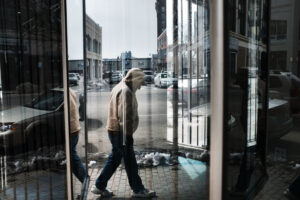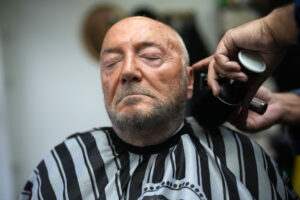What’s your deprivation fetish? Does the sight of a single mother pushing a pram with one hand while horsing down a Greggs sausage roll get you going? Perhaps the spectacle of a homeless person punting knocked-off earbuds on a street corner gets your blood up. Personally, nothing gets me in the mood quite like the sight of methadone being dispensed in a community pharmacy full of traumatised addicts sporting facial scars. Whatever your preferences, whether tales of gangland executions or prints of Eighties kids with rickets playing at the foot of boarded up tenements, in the UK, no penury kink is too shameful.
Nobody does poverty porn quite like the Brits. In the 2000s, it was The Jeremy Kyle Show, presenting the poor, vulnerable and imbecilic as circus freaks for the sport of a crowing audience of working-class viewers who couldn’t see the joke was on them. By the 2010s, with austerity in full swing, poverty porn evolved into a grittier reality-TV format, tracking the lives of various hapless protagonists in the lowest resolution possible, as they stumbled from pillar to post office. Today, in a cost of living crisis, poverty porn is once again mutating to save its own bacon, finding new life in unfamiliar forms where it lurks with rapacious intent, undetected by the untrained eye.
Its latest iterations take the form of news stories reporting tales of ingenious thrift in the face of skyward living costs and sanguine documentary films scored by stock, royalty-free piano. There, working-class presenters with little sociological grasp of the wider issues talk in sentimental platitudes about how sad, shocked, or angry they feel, bearing witness to the struggles of a permanent underclass — leaning into the well-worn televisual tropes which comprise poverty porn’s scope and aesthetic. Even well-meaning campaigners like Martin Lewis — whose endless tips on how we might save 7p a year by following 10,000 simple steps — fall within the genre which I will now attempt to formally define: any form of media that relies on poverty as a hook, while simultaneously failing to situate that poverty within a wider systemic context.
The latest submission to the UK penury porn canon is world-beating travel vlogger and YouTube sensation Bald and Bankrupt’s latest upload, “Offered Business on England’s Worst Street”: a 37-minute sociological gangbang in which Bankrupt — real name Benjamin Rich — titillates viewers by shooting BrewDog IPA-ridden loads all over the face of post-industrial Britain, in the form of clichéd drive-by analysis of how shit everything looks. “The shops they have here tell you everything about the state of the economy,” he says, on the standard rundown high street which has become shorthand for the UK’s managed decline. Yet he makes no attempt to elaborate on what that story might be. “We used to build things like this,” he exclaims, gesturing towards a building. “You can’t see a doctor, you can’t see a dentist,” one woman explains, with testimony which threatens to make the film slightly more engaging. Rich’s uncurious response: “That’s interesting, that’s interesting,” before cutting to the graffitied frontage of another derelict pub.
In this Vesuvian cum-shot of commentary, Rich leaves no stone unturned, no vandalised shutter unremarked upon, and no drug-addicted sex worker alone, in a one-man Durkheimian crusade to render the tell-tale signs of urban decay as one-dimensionally as is technically possible using the latest iPhone. There are so many opportunities throughout his journey from Plymouth to Birmingham and then Horden — the UK’s poorest town — to capture something other than the unbearable aesthetic noise of economic dereliction. But, sadly, Rich passes up the opportunity to dive deeper, and, in doing so, effortlessly embodies the vacuous reporting style that so often passes for journalism in the UK.
To get our jollies from porn, we must disengage the part of the brain which discerns truth from falsehood, and sometimes even right from wrong. Porn offers little but distraction and fleeting gratification and, like most media coverage of the topic of poverty, would be impossible to sit through if the ugly uncomfortable truths behind its production were placed front and centre.
Many naturally attribute poverty porn’s tackiness to the poor tastes of its predominantly lower-class audience — a justification cited endlessly by the upper-middle class creators of various soap operas and comedies which depict working-class and poor people amateurishly. However, public fascination with poverty is not just a reflection of what audiences want but also a measure of what is convenient and profitable for production companies and newsrooms to make. Working at the behest of profit-hungry proprietors, under the duress of a strict deadline schedule, or in the case of social media, algorithms which reward frequent uploads that retain audience attention and drive engagement, poverty porn is not a simple matter of taste (or lack thereof), but the result of economic imperatives which incentivise morally dubious content and practices.
Research into media portrayals of poverty and the poor, published by think tank the Joseph Rowntree Foundation in 2008, showed a tendency towards the sensational prevailed. Indeed, stories were often selected for their convenience to journalists working under time pressure. In daytime TV, the poor were frequently presented as dysfunctional, aggressive, and feckless. Peppered throughout the findings were prominent anonymised quotes from media professionals that revealed how stories about poverty are largely determined, not by social values, but by news values. One journalist said: “You have to make it eye-catching for the news editor to say, ‘Ah, I see why I’m doing this.’ The specialist correspondent has to make a very good case and so you are always looking for the most dramatic top line you can find.” The editor of a regional newspaper said: “Journalists don’t slam the door in the face of the poor. They just don’t go knocking. It’s not just the journalistic process: poor people don’t make their voices heard so their stories don’t get reported.”
The truth is poverty porn is big business. In the year before its cancellation — following the suicide of participant Steven Diamond, who took his own life after failing a lie-detector test — The Jeremy Kyle Show is estimated to have raked in around £80 million for ITV. The discussion around the show’s ethics, with respect to its premise, has always been something of a diversion from the exploitative economics that underwrote it, and all shows like it. All moral and creative justifications for Kyle’s bear-baiting, convincing as they may seem, were self-serving, post-hoc rationalisations: the freaks on that show were the ones behind the camera, who went along with ITV’s twisted Stanford Experiment all the way to a participant’s suicide. While old media struggles currently for the viewership numbers it once commanded, the tropes it firmly established with respect to poverty porn have not only made the leap to social media equivalents — hipsters filming themselves giving homeless people sandwiches being a recent toe-curling trend — but have also set the parameters for how most people think about poverty and the poor: poverty is a personal failing which can be transcended by a hard work, a positive mindset and less whining.
What’s fascinating about Bald and Bankrupt’s short film is that he is clearly nowhere near as cynical or ignorant as Jeremy Kyle. His YouTube channel is a rare deep dive into cultures that we in the UK are rarely shown. In one video, he travels across the border from Lebanon into Syria, attending a football match in Damascus, where the sight of crowds of Arabs jumping up and down, shouting, fills the heart with joy and not existential dread. In another film, he goes off-grid in Russia, hoping to locate space-shuttles built in the Soviet era. This is a guy who comes as close as a person in the 21st century can get to being an explorer, thanks to his unpretentious, no-nonsense style, his willingness to take genuine life- and liberty-threatening risks, and for the wonderful rapport he has with locals wherever he goes.
But his formula fails on home soil for one simple reason: Rich isn’t showing us anything we have not already seen. There is no novelty to distract from the lack of depth. No arresting vista to pull our attention away from the low production values. And no old men speaking Aramaic, accentuating a sense of intrigue and discovery, to pull focus from the ropey audio quality. All we see on screen is how little Rich understands the roots of the post-industrial malaise gripping the UK economy.
He rails against skyward rail ticket prices yet fails to outline why placing public transport financially out of reach is so damaging, not only to vital educational and employment opportunities, but also the environment. He fails to identify privatisation as a key factor in the UK’s lacklustre transport infrastructure, where the cost of taking a train seems correlated to how unpleasant journeys are becoming. He laments the death of the seaside town, as we all do, but has nothing to say about how a terminally neglected housing stock, cowboy rental markets and an exodus of first-time buyers from London have fundamentally altered their economic topography, pricing people out of the communities they were raised in. He prompts young Romanian boys to talk about how dangerous the community is at night, but fails to engage with local entrepreneurs of ethnic minority origin who are practically keeping what’s left of local economies alive.
Rich plays bingo with some locals and even has a dance in the pub, and in these moments his personable qualities really shine through, but he forgoes the open goal of examining why gambling and excessive drinking are the only industries operating in these areas which are not in decline: they numb the chronic stress, they quiet the aesthetic noise, and they provide the only safe, warm, comfortable public spaces where social solidarity is still possible. Rich is an everyman acting on his own curiosity, who seems genuinely shocked at the levels of dereliction and despair he witnesses. His problem is not a lack of empathy, nor a desire to exploit anyone; it’s all the bad habits he’s picked up from studying how old media has traditionally framed poverty.
“Don’t shoot the messenger,” he says, wisely foreseeing well-targeted criticism for his less than stellar depiction of urban dereliction, but his film contains no message. There is no substance, only spectacle. There is no visual flair, only the lazy visual shorthand poverty tourists love furiously beating their meat to. The moment a sex worker tells him she was punched in the face by an abusive man, you can just sense his inner elation at having captured another stereotypical image of deprivation. It’s when the vulnerable woman then asks if he’d like to acquire her services that internally he surely creams his y-fronts.
While programme makers have become slightly less terrible at it over the years — the trend has been towards more sympathetic and less judgemental portrayals of the poor and vulnerable — poverty porn nonetheless retains its essentially exploitative quality wherever it is found. Right now, somewhere on the streets of the UK, you can be sure that a troupe of media twats is rolling up on a housing estate somewhere to point three cameras at a wall-mounted ashtray filled with pregnancy tests, as they wait patiently in their warm rented cars for something vaguely dodgy to occur — all so they can capture it for Bafta’s consideration.
The story that is rarely told is the one about how resilient these communities are in the face of their economic immiseration. Not a half-brick’s throw away from every boarded-up high street, every abandoned building, and every burnt-out playpark with commemorative flowers tied to rusted fences, people face their hardships with courage, grace and humour. The single mother applies to go to university, having escaped an abusive male partner. The homeless person attends a mutual-aid group for men with mental health problems, drawing from a deep reservoir of psychosocial support provided by unpaid volunteers, and begins making amends for his transgressions. The traumatised addict keeps turning up at the chemist every morning despite the prejudice and judgement he faces, until one day, his methadone is dispensed for the last time, and he is finally free from the nightmare of addiction.
Sadly, these are stories that require time, money, insight, and compassion to tell. An accidental satire of the exploitative genre it so desperately attempts to emulate, Rich’s documentary gets repetitive so quickly because we’ve seen this smut so many times before that the spectacle simply fails to rouse us the way it once did.
Disclaimer
Some of the posts we share are controversial and we do not necessarily agree with them in the whole extend. Sometimes we agree with the content or part of it but we do not agree with the narration or language. Nevertheless we find them somehow interesting, valuable and/or informative or we share them, because we strongly believe in freedom of speech, free press and journalism. We strongly encourage you to have a critical approach to all the content, do your own research and analysis to build your own opinion.
We would be glad to have your feedback.
Source: UnHerd Read the original article here: https://unherd.com/




